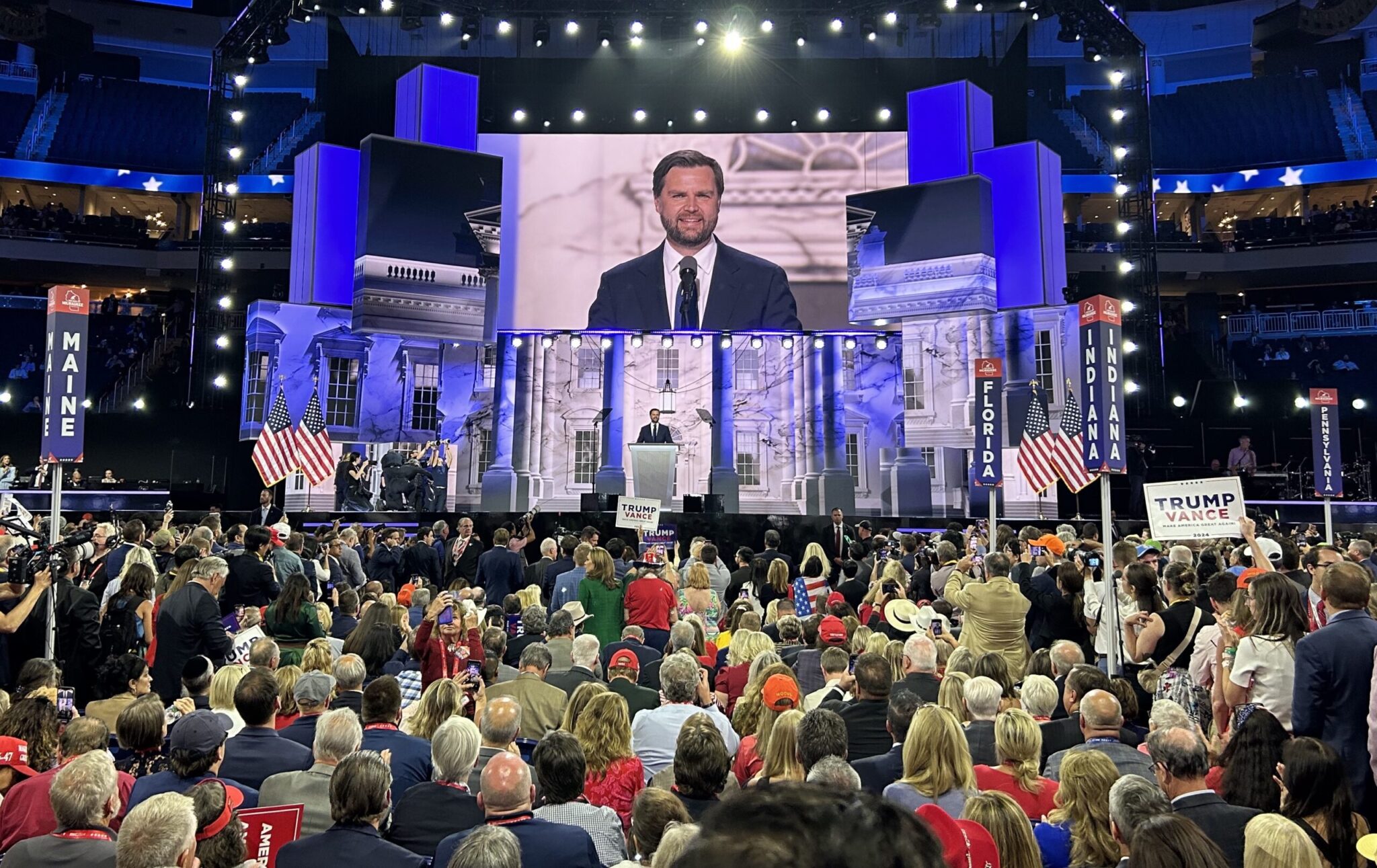Yalies take center stage in 2024 GOP political arena
Throughout the 2024 presidential election cycle, Yale alumni have been at the forefront of the Republican party. Ron DeSantis ’01 and Vivek Ramaswamy LAW ’13 both emerged as Republican candidates in the primary, and Senator J.D. Vance LAW ’13 was selected as the Republican VP pick.

Tristan Hernandez, Contributing Photographer
Three Yalies have been at the forefront of the Republican party throughout the 2024 presidential election.
Earlier in the election cycle, Florida Gov. Ron DeSantis ’01 and businessman Vivek Ramaswamy LAW ’13 were popular candidates competing to become the presidential nominee for the Republican party. Later, after former president Donald Trump secured the nomination on the Republican ticket, he announced junior Ohio Sen. J.D. Vance LAW ’13 as his running mate.
“The role of Yale is to provide the educational foundation in the liberal arts and sciences for an aspiring politician or anyone [preparing] to serve the American people,” said Alex Bavalsky ’25, a former co-president of the News’ independent editorial board, in September 2023. Bavalsky spoke generally of Yale alumni who ran for office from any political party.
DeSantis and Ramaswamy announced their campaigns in early 2023. Both dropped out of the Republican race in January 2024, with DeSantis polling at 4.1 percent and Ramaswamy at 11.1 percent at the time they suspended their campaigns.
Ramaswamy attended Harvard for his undergraduate education where he majored in biology and later attended Yale Law School where he funded his law degree through the Paul and Daisy Soros Fellowships for New Americans, a graduate fellowship designed for immigrants and the children of immigrants.
After Yale, he founded pharmaceutical company Roivant Sciences in 2014 and served as CEO until stepping down in 2021. Though other Yalies involved in this election cycle have been in politics for years, Ramaswamy has never held political office.
“Ramaswamy is an entertaining proxy for Trump on the debate stage and might siphon some MAGA Republican votes to make it a little harder for Donald Trump, but some of his views are so extreme, that they run the risk of making Trump more swallowable for some Republicans,” former Yale Law Democrats President Sage Mason LAW ’24 wrote to the News last September.
DeSantis earned a bachelor’s in history at Yale, where he was a member of Saybrook College, and later attended Harvard Law School. In 2013, he began his political career in the House of Representatives for Florida’s sixth district, maintaining a conservative record by opposing issues like abortion rights and the Affordable Care Act.
In January 2018, he officially declared his candidacy for Florida governor and went on to secure victory later that same year. During his time as governor, DeSantis has maintained conservative positions on issues like abortion, education, healthcare, and immigration in Florida.
After DeSantis suspended his presidential campaign, the News spoke with students and faculty across the political spectrum to gauge reactions to his withdrawal. The majority were unsurprised by DeSantis’ news of dropping from the race, many attributing his downfall to a lack of charisma and his failure to distinguish himself from Trump.
“The premise of the DeSantis campaign was that he was a more palatable Trump, but that didn’t work,” Philip Gorski, a professor of sociology, told the News in January. “Something I heard that captures this pretty well is, like, ‘why would you go see a Rolling Stones cover band if the Rolling Stones are still out on tour?’”
Later in the election cycle, after Trump secured the nomination, he selected Vance as his vice-presidential running mate. Vance, a 39-year-old native of Middletown, Ohio, had never held political office before winning his seat as a junior Ohio senator in 2022. He was best known for his New York Times bestselling memoir, “Hillbilly Elegy.”
He received his bachelor’s degree in political science and philosophy from Ohio State University and later attended Yale Law School, where he met his wife Usha Vance ’07 LAW ’13, who was a member of Morse College as an undergraduate. Vance later returned to Yale in 2017 for an event hosted by the William F. Buckley Program where he spoke about his memoir, recounting his Midwest family’s socioeconomic issues and the struggles and disparities of the American working-class population.
An attendee at the event previously told the News that the turnout for Vance was “unprecedented” for a speaker event at Yale that did not feature a major political figure as it took place years before Vance was elected to office.
Before gaining his seat as a senator, Vance was a Trump critic. When competing in the Republican primary for Ohio senator, a key endorsement from Trump helped him secure the nomination and has become a loyal ally of the former president. Vance now follows Trump in his tough conservative policies, opposing abortion and foreign aid for Ukraine, while promoting an “America First” agenda.
After Trump announced Vance as his running mate, Yalies expressed a wide range of reactions to the announcement. Some praised Vance for his ability to connect with working class and younger voters while others criticized him for his flip-flopping stance on Trump.
Trevor MacKay ’25 told the News in July that while he does not agree with everything Vance says or believes, he views Vance’s ideas and selection as the VP candidate as indicative of a substantial shift in the priorities of the Republican Party.
“I am sure that Yale and the professors here helped inculcate that intellectual aggressiveness in Senator Vance. There is a reason so many politicians have been graduates of Yale,” MacKay told the News. “Without Yale, I am sure there would have been no Senator Vance.”
Yale Law School is located at 127 Wall St.
Adam Walker contributed reporting.
Update, Aug. 31: This story has been updated to provide context for a September 2023 quote from Alex Bavalsky ’25.







